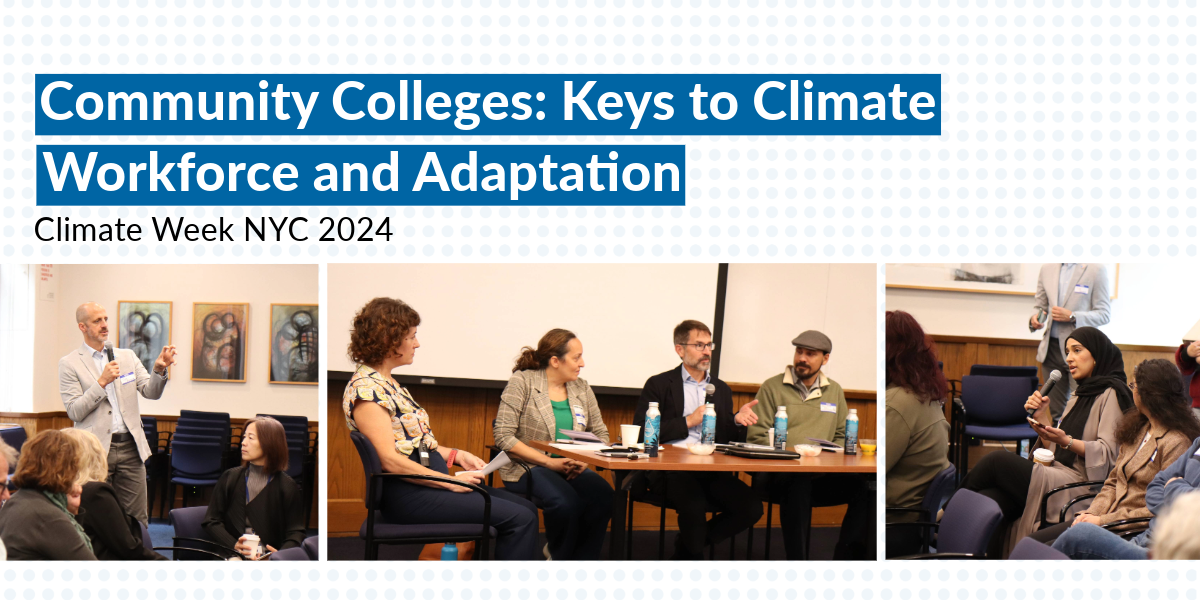Federal investment in mitigating the effects of climate change is expected to transform the nation’s workforce over the next decade. An estimated 70% of jobs created in the shift toward a climate-forward economy won’t require a bachelor’s degree. Given that community colleges already serve nearly half of the nation’s undergraduates and a large proportion of underrepresented students, they are uniquely positioned to facilitate an equitable transition to a green economy.
How can community and technical colleges adapt their practices to prepare the workforce for this shift?
An event hosted by CCRC, MDRC, and the Foundation for California Community Colleges on September 25 at Teachers College brought together higher education researchers and community college workforce leaders to address this question. The presentation and panel discussion were part of Climate Week NYC 2024, which included more than 600 events in New York City designed to promote climate action in all sectors of the economy and public policy.
“This green transition represents a huge economic transformation in the United States,” said CCRC’s Maggie Fay, who moderated the discussion. “We have an opportunity to make this transition one that centers workers and students and includes populations of people who have been excluded in previous workforce transitions.”
While communities across the country continue to face challenges due to climate change, potential students may be unaware of employment opportunities to address its effects. Robert Zandi, who helps direct renewable energy programs at Kingsborough Community College and is director of the City University of New York’s Offshore Wind Advisory Network (OWAN), spoke about how community colleges can implement successful training programs and promote enrollment by identifying outreach strategies that resonate with potential program enrollees.
“I found that many people just don’t know about the opportunities,” Zandi said. “And one of my biggest challenges and struggles has been to figure out how to most effectively reach as many people as possible.”
Jeffrey Clary, senior director of climate strategies at the Foundation for California Community Colleges (FCCC), pointed out that partnerships between colleges and outside organizations can be useful in promoting sustainable workforce programs. He gave an example of an FCCC project which partnered five California community colleges with non-governmental organizations in order to speed and scale workforce training in forestry management and curb the effects of wildfires.
By establishing this network of colleges and external partners, this project is getting people into good, meaningful jobs, Clary said. “Those jobs can prevent wildfires, so you’re actually doing work that benefits your community,” he added.
While funding is available for efforts to promote sustainability, accessing these resources is not always a straightforward process. Panelists cited other barriers to scaling green workforce programs, including misinformation about climate change and green technologies, a lack of qualified instructors, and a delay in aligning programs with available jobs
“One thing that’s unique about the green workforce transition is that it has to happen quickly,” Fay said. “We don’t have a decade for this to happen, and sometimes higher ed is not the best at moving quickly.”
Given these constraints, how can community colleges prepare students for the green economy quickly and at the scale that’s needed? Rachel Rosen, co-director of MDRC’s Center for Effective Career and Technical Education (CTE), said that in order to move toward a sustainable workforce, community colleges must foster creative collaboration. One way to do so is by strengthening partnerships with K-12 through programs such as dual enrollment and CTE in order to set students on a path toward a sustainable career. Community colleges can also work with regional employers to strengthen their workforce programs.
“There’s historic distrust between employers and community colleges, where they have different aims and different desires for what they want out of programs,” Rosen said. “Being able to get parties that have different goals on the same page about how they’re going to partner and do something is really important.”
Panelists agreed that opening communication not only between K-12 and higher education but also across colleges and the communities they serve is essential to removing barriers to a more sustainable workforce.
“There are a lot of policy issues that create barriers within our system,” Rosen said. “But I think having these kinds of events where we get people from different sectors into the same room to have those conversations is an important starting point.”





